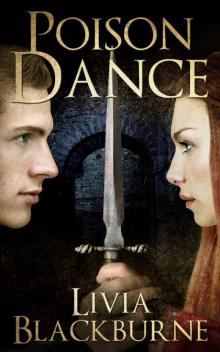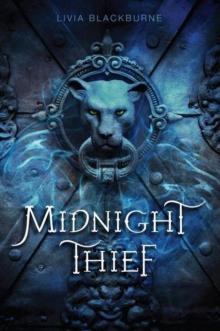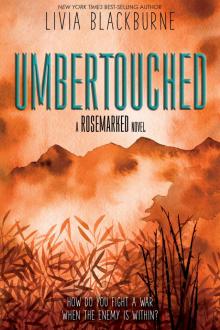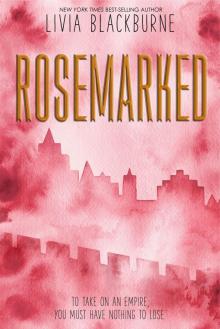- Home
- Livia Blackburne
Umbertouched
Umbertouched Read online
Copyright © 2018 by Livia Blackburne
Designed by Marci Senders
Cover art © 2018 by Katie Vernon
Cover design by Marci Senders
All rights reserved. Published by Hyperion, an imprint of Disney Book Group. No part of this book may be reproduced or transmitted in any form or by any means, electronic or mechanical, including photocopying, recording, or by any information storage and retrieval system, without written permission from the publisher. For information address Hyperion, 125 West End Avenue, New York, New York 10023.
ISBN 978-1-368-01181-5
Visit www.hyperionteens.com
To Amitha, Rachal, Jen, Emily, Coral, and Peta. First readers, and dear friends.
Title Page
Copyright
Dedication
Chapter One
Chapter Two
Chapter Three
Chapter Four
Chapter Five
Chapter Six
Chapter Seven
Chapter Eight
Chapter Nine
Chapter Ten
Chapter Eleven
Chapter Twelve
Chapter Thirteen
Chapter Fourteen
Chapter Fifteen
Chapter Sixteen
Chapter Seventeen
Chapter Eighteen
Chapter Nineteen
Chapter Twenty
Chapter Twenty-one
Chapter Twenty-two
Chapter Twenty-three
Chapter Twenty-four
Chapter Twenty-five
Chapter Twenty-six
Chapter Twenty-seven
Chapter Twenty-eight
Chapter Twenty-nine
Chapter Thirty
Chapter Thirty-one
Chapter Thirty-two
Chapter Thirty-three
Chapter Thirty-four
Chapter Thirty-five
Chapter Thirty-six
Chapter Thirty-seven
Chapter Thirty-eight
Chapter Thirty-nine
Chapter Forty
Chapter Forty-one
Chapter Forty-two
Chapter Forty-three
Chapter Forty-four
Chapter Forty-five
Chapter Forty-six
Chapter Forty-seven
Chapter Forty-eight
Chapter Forty-nine
Chapter Fifty
Chapter Fifty-one
Chapter Fifty-two
Chapter Fifty-three
Chapter Fifty-four
Acknowledgments
About the Author
You can tell plague guards by their fear. Some hold their sword hilts as if trying to crush them to dust. Others jump at the slightest brush of wind. Still others look fine from a distance, but up close, you see how wide their eyes are, how their gazes jump from bird to grass to stone.
You’d think that guarding a quarantine of civilians would be easier than fighting a battle. I mean, you’re not staring down a line of archers or charging into a wall of spears. But somehow it’s worse. Maybe it’s because there’s no fighting to heat up the blood, or because you can’t kill a fever with a sword. Whatever the reason, every soldier guarding the walls of Taof is terrified, and the citizens pay the price. This morning, a woman strayed too close to the perimeter and ended up with seven arrows in her back.
Which is why I stay low as I creep forward in the knee-deep grass outside the city, cutting as narrow a path as I can through the sharp, scratchy blades. Taof sits at the edge of the northern grasslands, where the plains start giving way to hills and shrubs. A road of flattened weeds and wagon ruts runs past the city gates, though I don’t walk on it—it’s far too easy to be seen.
It’s sundown, and the light is fading fast. My crow Slicewing circles around my head, ready to call a warning if anyone draws near. The other two crows are back in the hills with Zivah. Since the entire empire is looking for an umbertouched man traveling with a rosemarked woman, it’s safer for me to scout alone.
It’s been a month since Zivah and I barely escaped Sehmar City with our lives. A month since Commander Arxa unmasked me as a spy and Emperor Kiran started amassing an army to invade our homeland. We should have returned by now, but instead we’ve doubled back one league for every three we’ve traveled. We’ve gotten lost, run in circles, and huddled, starving, in caves as soldiers camped within steps of finding us. Finally, we managed to get as far north as Taof, only to run straight into a rose plague outbreak. Emperor Kiran’s declared a quarantine, and the river crossing ahead of us swarms with plague guards.
If we don’t find a way through soon, we’ll have to double back and follow the river for days upstream or downstream. Even the thought of doing that is maddening. Every day we lose makes me wonder if this will be the one that lets the Amparan army overtake us, that leaves our kin in Monyar to fight without our help.
“Lies!”
The shout sends a jolt through my entire body. I freeze, then realize that the speaker is too far away to have anything to do with me. Peering over the grass, I see a crowd of people outside the wall dressed in travel leathers. They look familiar. A big, grizzled man seems to be speaking to an official on their behalf.
“Lies,” the man says again. “We’ve been camped outside the city the whole time, and the horse market was across the river from the outbreak. None of us are a danger. If you put us within the quarantine, you might as well murder us all.”
Horses. Now I see the herd of them a short distance away, and I realize why these people look familiar. There’s no mistaking the elegant lines and long silky manes of Rovenni steeds. I had a run-in with this tribe back in Sehmar City. It wasn’t exactly a friendly visit, but Neju knows I don’t wish the plague on them.
I sneak closer.
“It’s Emperor Kiran’s decree,” the minister says in an oily voice. “You must be kept in the city because of new plague laws.”
“Lies. The emperor wants us all dead so he can take our stallions for his army.”
I remember this man. His name is Nush, and he once accused me of being a horse thief.
“Think carefully before refusing a direct order from the emperor,” says the minister.
It seems now that the soldiers guarding the gate all turn to watch.
Finally, Nush speaks again. “Keep us here if you must, but put us outside the walls. If you try to force us in, we’ll fight, and we have nothing to lose.” There’s enough threat in his voice that any smart man would take heed.
I don’t think the minister will bring in soldiers, but I can’t afford to wait and see what happens. Grass bends and crunches under my feet as I hurry away, and soon the ground starts to slope downward. The river is a thousand paces wide, swollen from the spring rains, and the water splashes and froths as it rushes past. It’s deep too, judging from the boats I saw earlier in the day. I don’t know what I’m looking for. An abandoned boat? A secret log bridge? Stone jutting up from the river at convenient intervals? It really isn’t the type of river to ford or swim, even for those as desperate as me and Zivah, and the only proper bridge is currently the centerpiece of the Taof quarantine.
Slicewing caws. I freeze. A lone soldier walks the grass toward me with wide, swaggering steps. He’s not looking in my direction, though, and I duck down into the grass. With any luck, he’ll walk right past. But since we’ve been short on luck lately, I wrap a hand around the hilt of my knife.
As he comes closer, I see he’s a typical Amparan sentry in standard armor. Not as scared-looking as the others now that he’s farther from the city, but I’m not impressed with the way he’s keeping watch. He looks like he’s daydreaming rather than scanning for fugitives. I notice he’s rubbed mud on his skin to
look like umbermarks. It’s not the first time I’ve seen someone try to fool the plague that way. Zivah says it doesn’t work.
The soldier swivels his face in my direction. His eyes widen.
Maybe not so much of a daydreamer after all. I tense my muscles to spring.
And then his face shifts. His skin darkens. His eyes grow more wide set, and his cheekbones more pronounced.
My knife falls from my hand. “Masista?”
The man’s face shifts back to that of a stranger. Gods, what was that? I grab on to my confusion and use it to propel myself into the man. For a moment, we’re a tangle of limbs—his neck is slick with sweat, and he smells like swamp mud—and then I catch his ankle with mine and throw him down. He hits the ground with a grunt as I sprint away.
“Halt!” he shouts.
What self-respecting fugitive has ever halted? I double my speed, plunging blindly through the grass. The soldier screams for reinforcements. I flinch as an arrow flies past my head, and I swerve toward the hills. Once I get there, I can disappear into the shrubs, but it’s at least a quarter league away. Hooves thunder behind me now, sending vibrations through the ground, and I bite back a curse, reaching for any last bit of speed.
It’s not enough. I skid to a stop as a soldier on horseback cuts me off, his warhorse kicking dirt into my face. Two other horsemen take their places behind me. That’s the problem with Amparans. They never want to give you a fair fight.
“Halt,” says the soldier in front of me, “or we’ll grind you into the mud.”
This time I halt.
I call myself all sorts of names as I put my hands up in the air. If the Amparans don’t beat me senseless, I’m tempted to do it for them. What kind of good-for-nothing fighter mistakes an enemy for a friend and drops his knife? There are toddlers in my tribe who could have done better.
The soldier who’d threatened to trample me dismounts now and raises his sword. He’s an ugly brute with a scar that makes his eyebrow look crooked.
“Who are you?” he asks. “What is your business out here?”
A sliver of an idea. Since I dropped my knife, that first soldier might not even know I’d drawn a weapon. “Sirs, there’s been a misunderstanding. I was just out to gather wood for our cooking fire.”
“You run pretty fast for someone with nothing to hide.”
It’s not hard to fake a nervous laugh. “I was afraid I’d be cut down on the spot.”
“You might be cut down yet.”
“I’m umbertouched, sir.” I reach for my sleeve, and Crookbrow raises his sword. “I’m just rolling up my sleeve,” I add. “I’ll move slowly.”
He doesn’t relax, but he doesn’t skewer me either.
“I have no reason to fear the plague,” I say, pulling up the fabric to reveal my skin, “but my fellow Rovenni do. We must boil river water if we want any chance of surviving, and wood from the riverbank burns hotter than grass.”
Crookbrow stares at my arm. In the moonlight, it’s hard to see the dark splotches that mark me as someone who survived rose plague and emerged immune, but you can find them if you’re looking. Crookbrow’s gaze moves from my umbermarks to a scar on my wrist. “He bears a Rovenni brand,” he tells the others.
If he were more observant, he would see that my brand is unevenly applied, the work of an amateur rather than a Rovenni elder. But I don’t bring that to his attention.
“Please,” I say. “I don’t want any trouble. Perhaps this evidence will be more convincing.” I detach a small bag from my belt and toss it at the soldier’s feet. He picks it up, his eyebrows rising at the heft of its jingling contents. My fingers curl into claws. It’s hard not to snatch the pouch right back out of his hand. That’s the last of our money, the leftovers of a purse I lifted from a traveling priestess of Mendegi. Maybe this whole thing is the Goddess’s wrath for stealing from her.
Crookbrow frowns as he weighs the bag in his hand. I wonder if he’s going to take the money and kill me anyway, but then he slips the pouch beneath his cloak. “We’ll escort you back to your kin, but if you leave again, we’ll shoot you like any other plague fleer, umbermarks or no.”
“Thank you, sir.”
Truthfully, though, I don’t know whether to be worried or relieved as the soldiers march me back toward the city. On the one hand, they didn’t recognize me. Still, I’m now at the Rovenni’s mercy. A word from them, and this entire charade will be over.
Outside the city gates, some haphazard wooden fences have been set up to form a corral. Several large square tents have been erected inside, and a handful of Rovenni mill beside them along with their horses. I see men and women, young traders and old. Amparan soldiers stand sentry outside the fence. As my guards bring me closer, the Rovenni gather around the gate, looking warily at my escorts and then at me.
The man Nush stands closest to the gate, legs planted wide as if he were still astride one of his steeds. I catch his eye. “I told you it was folly to send me out there, brother,” I say loudly. “Brother” might be too much, but I don’t exactly have time to send a subtle message. “Almost got me killed.”
Nush’s eyes are intent on my face, and his thick beard does nothing to hide his frown. I can tell he finds me familiar, though I’m not sure he can place me.
Crookbrow jerks me toward the gate by the sleeve of my tunic, rattling my bones. “You are all to remain inside this enclosure. Even the umbertouched.”
Nush stares at me, and I stare right back. If only we could send thoughts through our eyes.
Finally, the Rovenni grunts. “Kill this one if you want,” he says with a noncommittal shrug. “I won’t shed a tear.”
The soldier guffaws. “Your friend doesn’t seem overly fond of you,” he says. But he pushes me through the gate and returns to his horse, probably eager to go count his money. I stand next to the fence, painfully aware of all the traders’ eyes on me.
Nush clamps a large hand on my shoulder and pulls me toward the center of the enclosure. “Good to see you safely back, brother.” His arm is so heavy it’s a wonder I don’t sink into the ground. He steers me between tents until all Amparans are blocked from view, then whips me around to face him. “Who are you? I’ve seen you before.” He furrows his eyebrows again, and a flicker of recognition flashes in his eyes. He grabs the lapel of my tunic and yanks me closer. “You’re the umbertouched horse thief!”
I grab my tunic to keep the fabric from choking me. Do I look like a good target to push around? I used to cut a more intimidating presence. “I never stole any horses from you.” I pick my words carefully. Even though I never stole their horses, I did steal something else. To be fair, I was in some pretty desperate circumstances at the time.
Nush’s eyes flicker down to my wrist. “What is...” He grabs my arm and then runs his fingers over the brand. It tickles when he brushes the edge of the scar tissue. Comprehension dawns on the Rovenni’s face. “Why, you scoundrel,” he says. He holds my arm up for all around him to see. “This is the man who stole our branding iron,” he says.
I grit my teeth as murmurs sound all around. Everyone stares at me, and not in a friendly way. I cringe to think how far Nush’s voice might have traveled.
I step closer to him and lower my voice. “I can explain. And I can be useful to you. Just hear me out.” I don’t actually know how I’d help them, but I’ll say anything at this point.
Nush’s gaze doesn’t soften. “Our brands are legacies from the founders of our tribe. Our men and women train for years in horsemanship to make themselves worthy of the mark. It’s core to everything that makes us Rovenni, and you stole the iron as if it were no more than a horseshoe.”
I have a feeling that more lies will get me killed. “You’re right. I did steal your brand. I was a spy in Sehmar City and needed it to throw Arxa off the scent of who I really was.”
There’s a brief silence as Nush puts together my words. “You’re the Shidadi spy the emperor has been trying to capture.”
“Where is the healer you travel with?” he asks.
“She’s in a safer place than this,” I say. “But there’s no need for us to be enemies. I know you have no love for the empire. I can help you get out of the quarantine.”
The Rovenni man snorts. “Help us? You’re locked in here just like we are. You have no weapons and no horse.”
“I can help in other ways. Not all weapons are made of wood and metal.”
“You Shidadi might have a fearsome reputation, but you think too highly of your skill if you think one man can make a difference.”
I wrack my brain. “My companion the healer has some...unconventional tools. She’ll be able to help you.” Prove me right, Zivah. “We also stole a Rovenni stallion from the palace stables. You can have him back.”
Nush’s fingers spasm around my wrist. “You have Natussa?”
“If that’s the name of the roan stallion the emperor forced you to sell to the army, then yes.”
A change comes over Nush at the mention of that horse. Now he looks at me as if I’m a bug to brush away, rather than a bug he wants to squish. “Say your friend can help us. That means we’ll be raising arms against the empire’s soldiers. We’d become fugitives.”
“You can’t avoid it,” I say. “Kiran’s already forced you to sell your breeding stock to the army, and you know he’s trying to sicken your people. Unless you want to hand over your life’s work and the legacy of your ancestors, you’ll have to start fighting him soon, whether you want to or not.”
Murmurs erupt around us again. I hadn’t realized that the others had come closer.
“Help never comes free,” says Nush. “What do you want from us in return?”
This I can answer. “Create enough of a distraction so Zivah and I can cross the river without being seen. Help us flee north to Monyar.”
Nush glances around at the others. Perhaps what he sees is encouraging, because he looks back at me. “Tell us more about what your healer friend can do.”
I clench my fists, my eyes fixed on the torchlight dancing far below my hiding place. It’s too dark and I’m too far above the plains to see the people involved, but it doesn’t look good. Slowly, the flames travel in a ragged line toward the city. Will they kill Dineas, or will they take him prisoner?

 Poison Dance Proofreading Epub
Poison Dance Proofreading Epub Midnight Thief
Midnight Thief Umbertouched
Umbertouched Rosemarked
Rosemarked